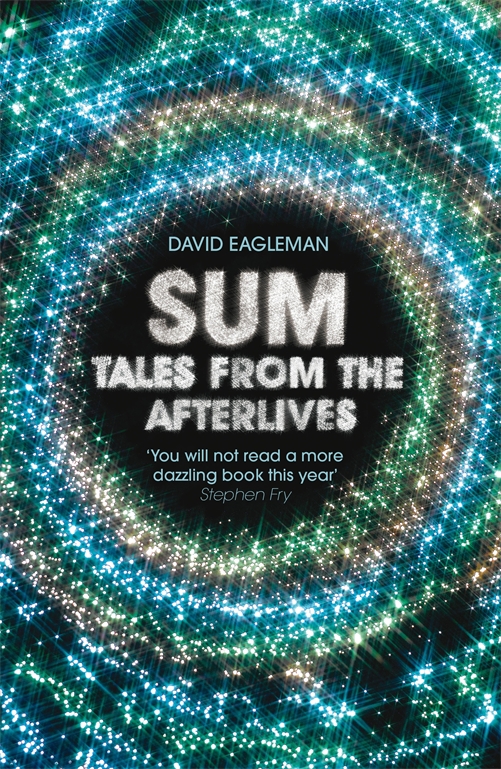Sum


Egalitaire
Circle of Friends
Descent of Species
Giantess
Mary
The Cast
Metamorphosis
Missing
Spirals
Scales
Adhesion
Angst
Oz
Great Expectations
Mirrors
Perpetuity
The Unnatural
Distance
Reins
Microbe
Absence
Will-o’-the-Wisp
Incentive
Death Switch
Encore
Prism
Ineffable
Pantheon
Impulse
Quantum
Conservation
Narcissus
Seed
Graveyard of the Gods
Apostasy
Blueprints
Subjunctive
Search
Reversal

In the afterlife you relive all your experiences, but this time with the events reshuffled into a new order: all the moments that share a quality are grouped together.
You spend two months driving the street in front of your house, seven months having sex. You sleep for thirty years without opening your eyes. For five months straight you flip through magazines while sitting on a toilet.
You take all your pain at once, all twenty-seven intense hours of it. Bones break, cars crash, skin is cut, babies are born. Once you make it through, it’s agony-free for the rest of your afterlife.
But that doesn’t mean it’s always pleasant. You spend six days clipping your nails. Fifteen months looking for lost items. Eighteen months waiting in line. Two years of boredom: staring out a bus window, sitting in an airport terminal. One year reading books. Your eyes hurt, and you itch, because you can’t take a shower until it’s your time to take your marathon two-hundred-day shower. Two weeks wondering what happens when you die. One minute realizing your body is falling. Seventy-seven hours of confusion. One hour realizing you’ve forgotten someone’s name. Three weeks realizing you are wrong. Two days lying. Six weeks waiting for a green light. Seven hours vomiting. Fourteen minutes experiencing pure joy. Three months doing laundry. Fifteen hours writing your signature. Two days tying shoelaces. Sixty-seven days of heartbreak. Five weeks driving lost. Three days calculating restaurant tips. Fifty-one days deciding what to wear. Nine days pretending you know what is being talked about. Two weeks counting money. Eighteen days staring into the refrigerator. Thirty-four days longing. Six months watching commercials. Four weeks sitting in thought, wondering if there is something better you could be doing with your time. Three years swallowing food. Five days working buttons and zippers. Four minutes wondering what your life would be like if you reshuffled the order of events. In this part of the afterlife, you imagine something analogous to your Earthly life, and the thought is blissful: a life where episodes are split into tiny swallowable pieces, where moments do not endure, where one experiences the joy of jumping from one event to the next like a child hopping from spot to spot on the burning sand.
In the afterlife you discover that God understands the complexities of life. She had originally submitted to peer pressure when She structured Her universe like all the other gods had, with a binary categorization of people into good and evil. But it didn’t take long for Her to realize that humans could be good in many ways and simultaneously corrupt and meanspirited in other ways. How was She to arbitrate who goes to Heaven and who to Hell? Might not it be possible, She considered, that a man could be an embezzler and still give to charitable causes? Might not a woman be an adulteress but bring pleasure and security to two men’s lives? Might not a child unwittingly divulge secrets that splinter a family? Dividing the population into two categories—good and bad—seemed like a more reasonable task when She was younger, but with experience these decisions became more difficult. She composed complex formulas to weigh hundreds of factors, and ran computer programs that rolled out long strips of paper with eternal decisions. But Her sensitivities revolted at this automation—and when the computer generated a decision She disagreed with, She took the opportunity to kick out the plug in rage. That afternoon She listened to the grievances of the dead from two warring nations. Both sides had suffered, both sides had legitimate grievances, both pled their cases earnestly. She covered Her ears and moaned in misery. She knew Her humans were multidimensional, and She could no longer live under the rigid architecture of Her youthful choices.
Not all gods suffer over this; we can consider ourselves lucky that in death we answer to a God with deep sensitivity to the byzantine hearts of Her creations.
For months She moped around Her living room in Heaven, head drooped like a bulrush, while the lines piled up. Her advisors advised Her to delegate the decision making, but She loved Her humans too much to leave them to the care of anyone else.
In a moment of desperation the thought crossed Her mind to let everyone wait on line indefinitely, letting them work it out on their own. But then a better idea struck Her generous spirit. She could afford it: She would grant everyone, every last human, a place in Heaven. After all, everyone had something good inside; it was part of the design specifications. Her new plan brought back the bounce to Her gait, returned the color to Her cheeks. She shut down the operations in Hell, fired the Devil, and brought every last human to be by Her side in Heaven. Newcomers or old-timers, nefarious or righteous: under the new system, everyone gets equal time to speak with Her. Most people find Her a little garrulous and oversolicitous, but She cannot be accused of not caring.
The most important aspect of Her new system is that everyone is treated equally. There is no longer fire for some and harp music for others. The afterlife is no longer defined by cots versus waterbeds, raw potatoes versus sushi, hot water versus champagne. Everyone is a brother to all, and for the first time an idea has been realized that never came to fruition on Earth: true equality.
The Communists are baffled and irritated, because they have finally achieved their perfect society, but only by the help of a God in whom they don’t want to believe. The meritocrats are abashed that they’re stuck for eternity in an incentiveless system with a bunch of pinkos. The conservatives have no penniless to disparage; the liberals have no downtrodden to promote.
So God sits on the edge of Her bed and weeps at night, because the only thing everyone can agree upon is that they’re all in Hell.
When you die, you feel as though there were some subtle change, but everything looks approximately the same. You get up and brush your teeth. You kiss your spouse and kids and leave for the office. There is less traffic than normal. The rest of your building seems less full, as though it’s a holiday. But everyone in your office is here, and they greet you kindly. You feel strangely popular. Everyone you run into is someone you know. At some point, it dawns on you that this is the afterlife: the world is only made up of people you’ve met before.
It’s a small fraction of the world population—about 0.00002 percent—but it seems like plenty to you.
It turns out that only the people you remember are here. So the woman with whom you shared a glance in the elevator may or may not be included. Your second-grade teacher is here, with most of the class. Your parents, your cousins, and your spectrum of friends through the years. All your old lovers. Your boss, your grandmothers, and the waitress who served your food each day at lunch. Those you dated, those you almost dated, those you longed for. It is a blissful opportunity to spend quality time with your one thousand connections, to renew fading ties, to catch up with those you let slip away.
It is only after several weeks of this that you begin to feel forlorn.
You wonder what’s different as you saunter through the vast quiet parks with a friend or two. No strangers grace the empty park benches. No family unknown to you throws bread crumbs for the ducks and makes you smile because of their laughter. As you step into the street, you note there are no crowds, no buildings teeming with workers, no distant cities bustling, no hospitals running 24/7 with patients dying and staff rushing, no trains howling into the night with sardined passengers on their way home. Very few foreigners.
You begin to consider all the things unfamiliar to you. You’ve never known, you realize, how to vulcanize rubber to make a tire. And now those factories stand empty. You’ve never known how to fashion a silicon chip from beach sand, how to launch rockets out of the atmosphere, how to pit olives or lay railroad tracks. And now those industries are shut down.
The missing crowds make you lonely. You begin to complain about all the people you could be meeting. But no one listens or sympathizes with you, because this is precisely what you chose when you were alive.
